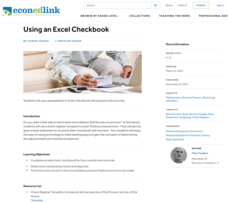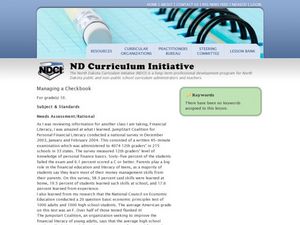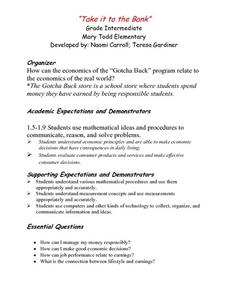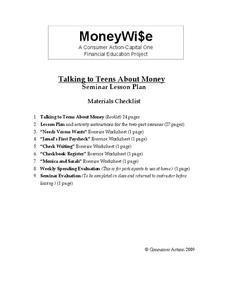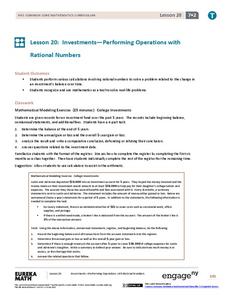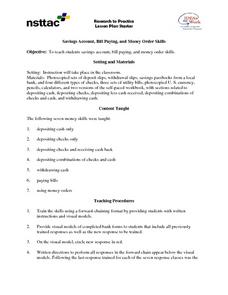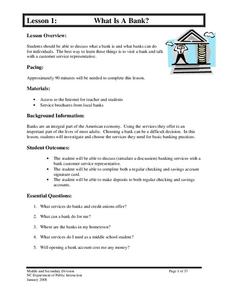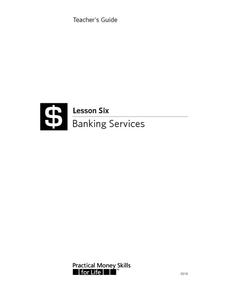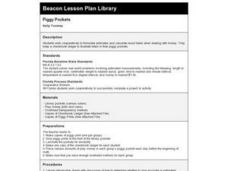Council for Economic Education
Using an Excel Checkbook
High school is the time that many scholars get their first jobs. Help young entrepreneurs apply economic principles to crucial skills for their new jobs and for functioning in society in general. They use Excel to balance a checkbook by...
Curated OER
Managing a Checkbook
How do grown ups do it? Teach your upper graders the ins and outs of personal finance by having them use their algebra skills to balance a checkbook. They examine the financial side of math, set up a checking account, and balance their...
Curated OER
Take It To the Bank
Examine how the economics of a school store relate to real world economics. Elementary students explore various websites, complete a Venn diagram, create a schedule of wages for the students, read the book "A Chair For My Mother" and...
Finance in the Classroom
Unit on Checking
As part of a four-lesson unit on personal finances, class members practice using a checkbook. Exercises include writing checks, filling out deposit and withdrawal slips, and keeping a check register.
Consumer Action
Talking to Teens About Money
Your teenagers are probably very good at spending money, but how good are they at managing it? Teach class members about banking, checking accounts, interest rates, car insurance, and many other relevant concepts with a series of...
Federal Reserve Bank
Cash the Check and Track the Dough
From checking and savings accounts to learning the importance of maintaining records and balancing a bank account, prepare your students to become financially independent and savvy adults, and explore all the intricacies of owning a bank...
Federal Reserve Bank
It's Your Paycheck
Beyond reading and arithmetic, one of the most important skills for graduating seniors to have is fiscal literacy and responsibility. Start them on the right financial track with nine lessons that focus on a variety of important...
Curated OER
Accounting -- Cash Control Systems
Students study cash control systems, such as checking accounts, endorsing checks, and writing checks. They verify and then reconcile a bank statement. They journal about a bank service charge or dishonored check and establish a petty...
Curated OER
Susita's Account
Your algebra high schoolers double their money monthly in this task based on a checking account balance. Learners write an equation to model the situation and then use their model to answer contextual questions.
Curated OER
Business: Making a Budget
Students plan a one-month budget, allowing for unexpected expenses. Using checkbook skills, they pay mock bills. Working in small groups, students watch a teacher-prepared Powerpoint presentation, visit financial Websites, and utilize...
EngageNY
Investments—Performing Operations with Rational Numbers
Partners fill out a register to record transactions on a college investment account. They use the amounts listed to calculate the running and current balance of the account, providing experience in adding and subtracting rational numbers.
Federal Reserve Bank
Banking on Debit Cards
What are the advantages and disadvantages of using a credit card versus a debit card? What are the costs of using a debit card irresponsibly? Here you'll find a lesson on key concepts that every learner should know...
Curated OER
Savings Account, Bill Paying, and Money Order Skills
What do you do after you get a paycheck? Help your mildly disabled learners how to bank wisely with a guided-skills activity. They practice cashing checks, withdrawing money, paying bills, and procuring money orders. The entire learning...
North Carolina Department of Public Instruction
What Is A Bank?
You're never too young to learn about banking and personal finance. Use a set of seven banking lessons to teach middle schoolers about checking and savings accounts, interest rates, loans and credit cards, and safety deposit boxes.
Visa
Banking Services
From writing and depositing checks to comparing ATM and debit cards, pupils develop financially savvy practices and build foundational knowledge of the financial service products available through banking institutions.
Federal Reserve Bank
A Penny Saved
Budgeting, net vs. gross pay, savings, and fees are all key elements of personal financing and essential for your class members to learn about as young adults.
Wells Fargo
Hands on Banking
What happens to your money between the time you make a bank deposit and the time you decide to spend it? Take middle schoolers and teens through the process of opening checking and savings accounts, creating a personal budget,...
Illustrative Mathematics
Bank Account Balance
Represent the ups and downs of a bank account. The two-part task points out that some types of graphs may better show discrete functions than others. Pupils analyze a graph on how well it represents the situation. They develop their own...
Curated OER
FINANCE AND RESPONSIBLE LENDING.
Students study the role of banks, lending and their services. In this analysis lesson plan, students learn about savings, checking accounts and lending and the importance of banks as financial intermediaries.
Curated OER
Checkbook Math
Twelfth graders simulate balancing checkbooks by applying required mathematical operations. They examine newspaper ads from banks and compare various services they offer. They discuss the uses of credit and debit cards.
Curated OER
Checks and Balances
Students examine how bank checks work and follow the "journey" of a written check. They discuss how transactional accounts work, identify and discuss the various parts of a check, and participate in a simulated business transaction...
Practical Money Skills
Saving and Investing
Learn the difference between saving money and investing money, as well as the advantages and disadvantages of each. Kids review banking and personal finance terms before studying the different ways that people can reach their financial...
Curated OER
Accounting -- Preparing Payroll Records
Students review preparation of payroll records and practice these skills while playing games on the computer. They follow a student outline and complete online activities and quiz.
Curated OER
Piggy Pockets
Second graders determine when estimates and exact totals are appropriate in dealing with money. They simulate keeping a checking account over a period of time and keep a checkbook ledger to record deposits and expenses.
